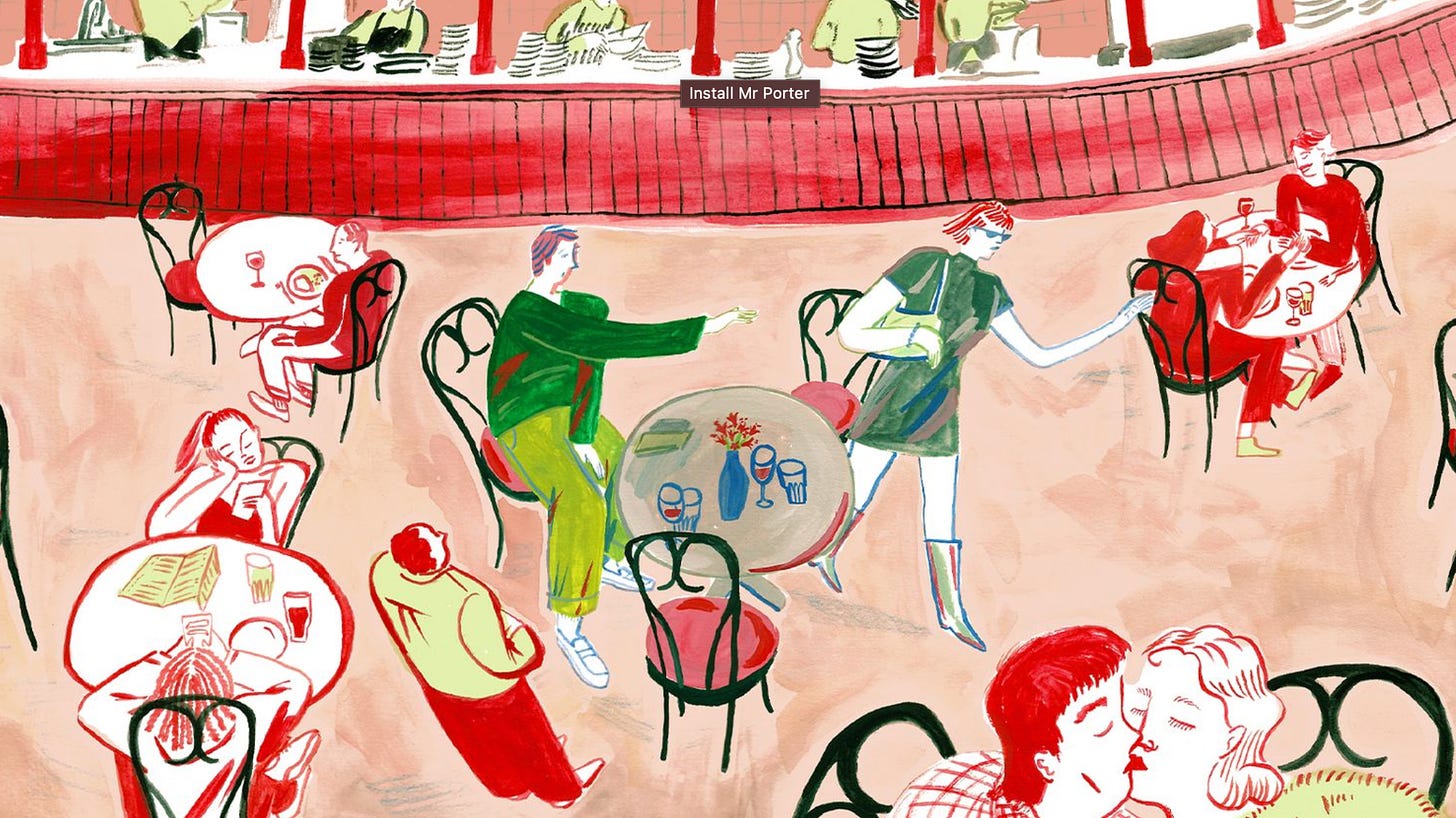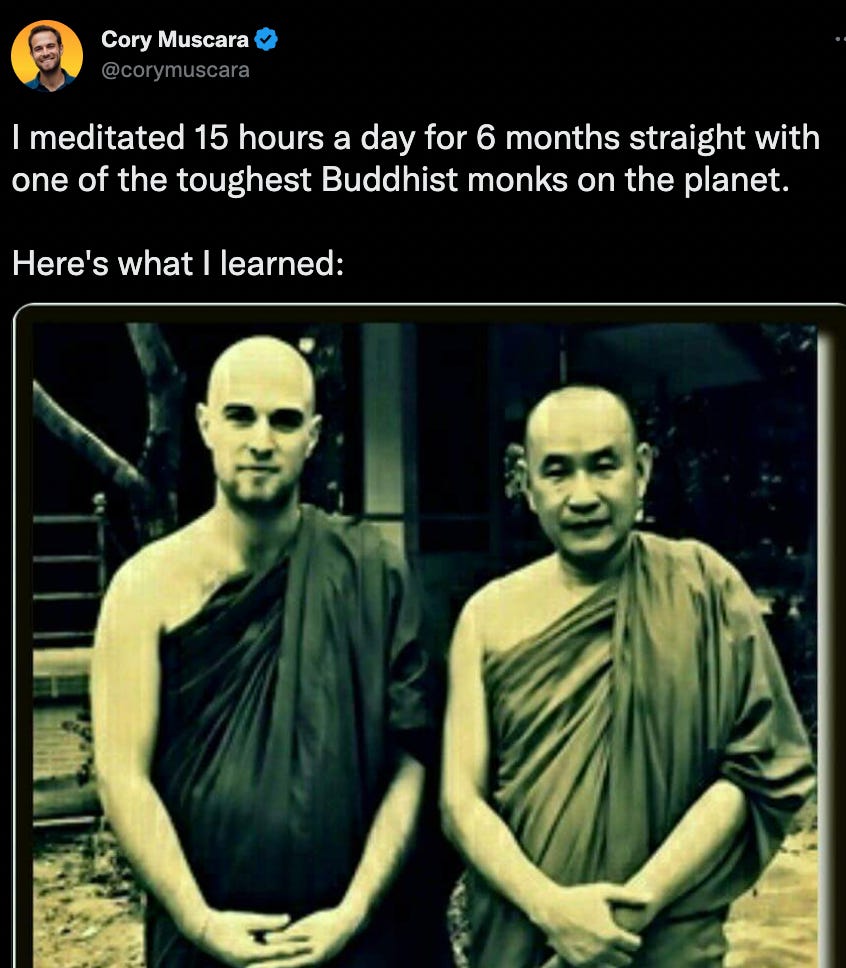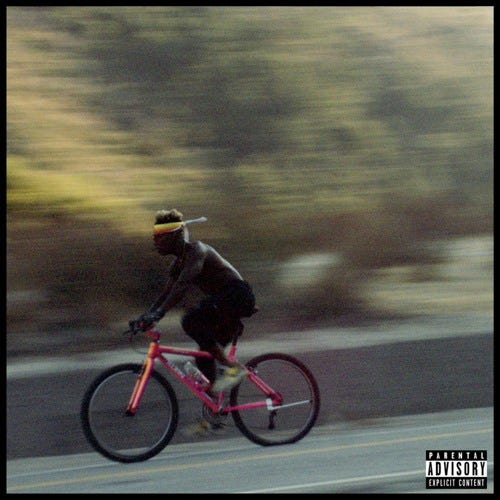Edition #133: Attachment to Life and Love
Plus, an amazing short film, a song, and monk-laden wisdom
A Note From the Editor
Around this time last year, I was deep into my season of dating. For about six months straight, I dated the way one does in New York—as if it were a competitive Olympic sport. I went on wonderful dates and terrible dates, with film directors and aspiring musicians, hedge fund managers and stand-up comedians. I dated frequently and with zeal, sometimes going on as many as five dates a week.“Stop me if I’ve told you this before,” I’d preface, worried I might be repeating a story I’d already told. One week, I got drinks at a sexy cocktail bar in my neighborhood. It was a Tuesday. My date and I ended up bonding with our server, chatting and exchanging jokes about being ashamed of hailing from Florida. On Wednesday, I had another date that looked vaguely similar to the one from the night before. He chose the bar—the same one as the night before. The moment we arrived, the server rushed up to us. “So nice to see you two again,” he said.
All this dating meant I had very little time to properly process anything I was experiencing. I got into the habit of making snap judgments branded as gut feelings, characterizing a person before meeting them based on the venue they chose and the neighborhood they lived in. I didn’t know how I felt about these men and women, or about myself, because I was sloshing through in the grind of it all. The bottom would never hold.
I have been out of my season of dating for nearly a year now, but slowly, slowly, I am opening back up to the idea of it—not to the soulless grind, but to the prospect of a fresh, real connection. Recently, I was submerged in a bathtub full of ice, breathing deeply and slowly, when the revelation popped into my mind—you’re living in a town of comically good-looking people. You can date again. Greek gods and goddesses walk the streets barefoot, their tanned arms decorated with constellations of artful tattoos. They carry surfboards and ride beat-up motorcycles without helmets; they make strong eye contact as you ride past. I decided I could go on a date or two, that I could kiss someone if I felt like it. And so I did, and a curious thing began to happen: I discovered my long, latent attachment style.
I sit across the table from a handsome, understated man with a large Instagram following. I am slightly overdressed but feeling radiant. We share Pad Thai and some sushi, a glass of wine each. He is kind to the waiters and asks good questions; answers mine with vulnerability. We eat ice cream side-by-side on a bench like teenagers, the backsides of our arms hardly touching. His flavor is better than mine, though I don’t admit it. After, I drive him home. He places his hands on my shoulders during the ride—expertly, assumptively, digging his thumbs into the tense pockets of my upper back and neck.
In the days following my first date back, and then my second, I began to notice an internal nagging, akin to the discomfort of a bad hangnail—not entirely intrusive, but still a bit distracting. Despite having lukewarm feelings about both of my dates, I constantly wondered whether I would hear from either of them again. Even after I heard from them, the nagging was still present. I wondered what needed to be soothed in me, what brand of validation I was looking for from these exchanges. All this led me to Google search “attachment styles,” a phrase I’d heard tossed around the internet but never paid any real attention to. Lo and behold, a new world was soon to be unearthed, courtesy of the late psychologist John Bowlby.
I sit across the table from a handsome, confident man. I’m in the same outfit, equally radiant. I decide it is my new date outfit. He charms the waiter, asking for recommendations we don’t take. He shows me a Powerpoint presentation on his phone, I smile and nod along, feigning interest. We a share pizza and a big salad. He asks after my family; expresses a glazed-over empathy at the right times. I tell him about my 30th birthday party, doing the New York seize-up—do we know the same places? Are our lives the same, back there? After, I drive him home. He places his hands on my waist during the ride.
“Like all the girls in town do,” he says.
There are four attachment styles—anxious, avoidant, disorganized, and secure. According to Bowlby, these attachment styles are formed within the first 18 months of our lives based on how our primary caregivers responded to our needs. I took a quiz and discovered I have an anxious/ambivalent attachment style, something my ego spent years carefully concealing. Reading about the characteristics of anxious attachment was fascinating and off-putting, as though someone had read my diary and published all of my insecurities on the internet. It also felt freeing to learn there isn’t anything inherently wrong with me, that this reaction is a natural response to the environment in which I was raised.
A shared this discovery on the phone with a dear friend a few days later, inquiring as to whether she had put any thought into her attachment style. She said that she never feels insecure during the beginning phases of dating, but when she’s in a serious relationship, the insecurity begins to sneak in. I have the exact opposite experience, I told her. When I know someone has committed to me I feel deeply secure. I’m never jealous of exes or of other people flirting with my partner at a party—if anything, the flirting only makes me more attracted to the person I’m with.
I am lying in Savasana, corpse pose, sweaty and splayed out on the mat. Around me, the air is still. The yoga teacher instructs us to relax our faces, the backs of our throats, our eyebrows. There is nowhere else we need to be, she assures, and nothing else we need to do. I feel the breeze caress my cheek and I realize one day my parents are going to die. They’re in their late 60s, closer to death than birth, and at some point, I’ll wake up and they will no longer be here. I wonder how it must feel. knowing you’re walking, slowly, toward the open door. My eyes fill with tears. I realize that I, too will one day be in my 60s, if I’m lucky. And at some point, my soul will leave my body, exiting this Earth. I wonder where I’ll be, if it’s possible to just dissipate into nothingness. I remind myself that I don’t remember what it was like before I was here and so I don’t need to worry about where I’ll end up, after. I probably won’t even remember this life, wherever I am. I try to imagine that I don’t exist at all and it feels like a free fall; sheer panic.
“Just breathe,” the yoga instructor says. “Relax deeper.”
I was recently having dinner with a pair of new friends. We talked about surfing, traveling, and our other lives outside of Costa Rica. I mentioned the yoga class I’d been attending—a sunset vinyasa with a beautiful, unobstructed view of the ocean—and suggested they give it a try. As I continued to talk, I found myself confessing the strange sensation I’d been experiencing. At the end of every practice, my mind has been temporarily held hostage by intrusive thoughts of death.
Contemplating death is a requisite of being human, but these intrusive thoughts were especially strange because I have never felt deeply afraid of dying. I’ve been terrified of losing my parents or loved ones, but the thought of my life ending doesn’t send me on the same downward spiral. At several points throughout the past decade, when I’ve seen something profoundly beautiful or felt deeply content, I’ve said to myself, “If I were to die right now, I think I would be OK with it.” I suspect anyone who has dealt with depression will understand this—when you’re spirit dips as low as it can go while sustaining human life, your relationship with death changes shape. It becomes less of a thing to be feared and more of a conceptual mechanism for relief. Knowing there will be an inevitable end can feel, at certain times, like solace. A grace.
Yet for the first time in my adult life, I’ve begun to understand the fear of death. As the waitress cleared our plates and the sun set behind us, my new friend said, “Maybe it’s because you’re enjoying your life so much now. And you’re suddenly realizing it will eventually end.”
How profound moments find their way to us—through new friends and old, through webs of connection and conversations recounted on varying continents, in different timezones. It was later that evening when I began to understand my dear friend’s slow-growing anxious attachment while in a secure relationship—when you begin to love something, the stakes grow sky-high overnight. Jack’s beanstalk. From this new vantage point, you are soaring, but you glance down and realize just how high up you are, how precariously balanced on the edge. You peek at the ground and think of how it all could end, just like that. But still, you’re soaring. You can choose to close your eyes, for a moment, and relish in the ride. Feel the wind on your face.
Cheers, my dears, and as always, thanks for reading. If you liked today’s edition and look forward to receiving these emails each week, consider upgrading to a paid subscription. As a full-time freelance writer, paid subscribers buy me the time and energy needed to dedicate to this newsletter each week. I’ll be restructuring my paid offerings in the coming month and pay-walling a bit more of this weekly email, so now’s the perfect time to subscribe if you’re been considering it!
I hope you have a lovely weekend. I’ve finally had a minor breakthrough in my surfing journey and I can actually catch more than one wave per session—bless. I’ll be spending this weekend surfing, working on my first play script, attending a friend’s birthday party, and eating lots of fruit. Bake yourself something delicious and watch a new movie—I can’t wait to see this one when I’m back in the states.
Three Pieces of Content Worth Consuming
Two Strangers Who Meet Five Times. This super short film is incredible, and if there’s one thing you consume from today’s edition it should be this. I found this one whilst doing a search to determine whether creating a captivating, two-man film is feasible. After watching a few shitty ones stumbled upon this one and it changed my mind. This film is a case study of the ways in which. we change, quite drastically, throughout the seasons of our lives, and a lesson in being mindful in our interactions with strangers.
You Can’t Say That (Or Can You?) In the age of political correctness and careful language, I found this quiz about what is and isn’t considered offensive by the masses quite interesting.
How to Embrace Doing Nothing. An oldie but goodie from Arthur Brooks’ column for The Atlantic. I’ve come a long way in the it’s-ok-to-do-nothing journey but I still struggle to sit still for too long. The best part of this piece is this line: “one of the most overlooked techniques for improving our lives is subtracting complication.”
Perhaps You Should…Ingest Some Monk-Laden Wisdom
There have been a lot of cheesy lists going around the internet lately—and you might argue that this is one of them, but there were many useful tidbits on this list. Numbers 5, 16, 26 (!!!), and 29 (!!!) were most interesting to me. Also, years spent with a monk resulting in a Twitter thread list feels like a bad parody of modern culture, but here we are!
**Bonus Content** (Just a Song, Sorry Folks!
I usually pull. a bunch of funny links from Instagram for this section, but I deleted the app off my phone in a temporary fit of millennial angst last night (whoops!). Instead of something funny, here’s a song I listen to on repeat constantly. Enjoy!
A Quote From A Book You Should Read:
“He thought about the difference between good times and bad times, and how funny it was that he could not state the difference, only feel it.”
-Going After Cacciato by Tim O’Brien
This newsletter is best served with a side of conversation, so drop your opinions, reflections, and thoughts in the comments below and let’s get to talking.
Or, share the most thought-provoking piece from today’s edition with someone you love, then call them up to discuss, debate, and percolate. As a wise woman once said, “Great minds discuss ideas.







Wow. Thank you for this. So much to absorb and think about. I had not taken the attachment quiz before but was not surprised at the outcome. It was very interesting to learn more about myself.
As someone whose parents died when I was in my 20's and who is currently happier than I have ever been, I don't fear death as others do. Life can be short but you need to live your life to its fullest. You have made the necessary changes to your life to have the life you love now.
And the people in CR are amazing! Go for it!!